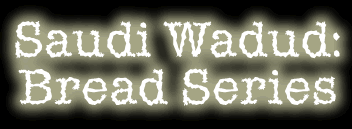 |
"The continuation of life depends
on our ability to
tolerate the unknown or unfamiliar
. . ."
-- Valerie Andrews |
| Organized religion has
had an effect on my sense of spiritual identity. Year ago, I resolved
to forego a traditional religious label because of ignorance of my Islamic
roots, and serious doubts about my Christian environment at school. These
circumstances fostered a sense of deep dissatisfaction and disappointment
toward conventional religious belief systems. I was compelled, however,
to reinvestigate this conclusion when my fiancé (at that
time) decided to pursue the Rabbinate, and asked me to convert to Judaism.
Click on the thumbnails
below to view enlargements. |
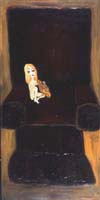 |
| My paintings confront
the etiology of spiritual identity -- they are quests for explanations
broadened into a more general habit or seeing the present and future in
terms of the past. They strive to understand the role that organized religion
plays in the search for truth and identity. |
 |
| I have used a loaf of bread
(Jewish challah) in my work metaphorically: while it represents the concepts
of religion and the role it can play in one's sense of identity, it also
represents my struggle with the idea of converting to Judaism, or any
religious ideology. |
 |
| Bread is a finished product
of many people throughout time: the planters, the farmer, the harvester,
the buyers, the millers, the bakers, the vendors, and the consumers. It
seems to me that the bread itself is such a polished product, and of such
variety, (depending on the grain and the baking technique). It is appealing
for consumption by most on the planet. But, it is often swallowed with
little regard to the effort and process behind its creation, (i.e., its
true worth or "meaning"). |
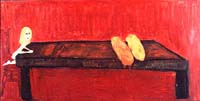 |
| I find this unsettling
since each person may claim their bread to be the richest, finest of truest
of all. It is amazing how the basic regard for it as a universal form of
sustenance is lost, as well as forgetting the collaborative effort of many
that it took for its evolution. The irony is, that which should so unite
and bind the masses onto common ground instead serves as a form of segregation,
division and separation. |
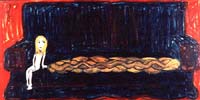 |
The figures in the paintings
are self-portraits. It is only through personal
investigation that I
can find true focus. The relationship in each painting between the figure
and the bread represents various stages of this search. For example, sometimes
she is empowered, sometimes she is consumed, but the bread seems to constantly,
almost ominously, remind her of
her ambivalence, loneliness
and vulnerability in this matter. |
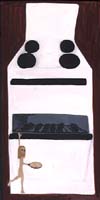 |
| She left the comfort zone of
ignorance when she started to question this part of herself, and she has
been exposed -- which is portrayed by her smallness and childlike nakedness.
Ironically, though, despite the magnitude of her search, she appears calm
and composed. Is this to assert her freedom from conformity? Her freedom
to choose not to be anything? |
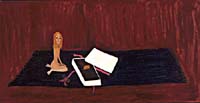 |
| I am tired of ignorance
of religion. Both are fear-based reactions to the daunting task of confronting
spirituality, and both have dangerous consequences. I believe that there
is a basic need for spiritual fulfillment of some nature and at some level
by every human being since the beginning of time, and I think that most
of the major religions have helped to keep individuals accountable for
their actions. |
 |
| But what other sources of strength
can be drawn upon in a society that thrives on the liberation from traditional
religion? I have not yet found any one religion to provide a sole source
of solace or strength in my relationship with the rest of the world. Will
this yield camaraderie or alienation in the future? |
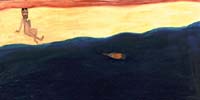 |
| Saudia Wadud is a candidate
for the Certificate in Art History and Theory at the School of the Art
Institute of Chicago. |
 |